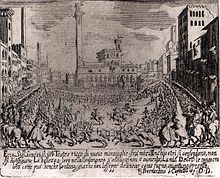
Back باليو دي سيينا Arabic پاڵیۆ دی سیینا CKB Sienské Palio Czech Palio di Siena Danish Palio di Siena German Palio (Sieno) Esperanto Palio de Siena Spanish Sienako Palio Basque Palio di Siena Finnish Palio de Sienne French
| Palio di Siena | |
|---|---|
 | |
| Status | active |
| Genre | historical horse race |
| Date(s) | 2 July and 16 August |
| Frequency | annual |
| Location(s) | Piazza del Campo, Siena |
| Country | Italy |
| Inaugurated | 17th century Palio "alla tonda" 1633 |
| Most recent | 17 August 2024 |
| Next event | 2 July 2025 |
| Participants | Contrade of Siena |
| Organised by | Comune di Siena |
| Website | Palio di Siena |

The Palio di Siena (Italian: [ˈpaːljo di ˈsjɛːna]; known locally simply as Il Palio; from Latin pallium) is a horse race held twice each year, on 2 July and 16 August, in Siena, Italy. Ten horses and riders, bareback and dressed in the appropriate colours, represent ten of the seventeen contrade, or city wards, in a tradition dating back to the 17th-century. The Palio held on 2 July is named Palio di Provenzano, in honour of the Madonna of Provenzano, a Marian devotion particular to Siena which developed around an icon from the Terzo Camollia area of the city. The Palio held on 16 August is named Palio dell'Assunta, in honour of the Assumption of Mary.
Sometimes, in case of exceptional events or local or national anniversaries deemed relevant and pertinent ones, the city community may decide for an extraordinary Palio, run between May and September, such as on 9 September 2000, to celebrate the city entering the new millennium and on 20 October 2018, in commemoration of the centenary of the end of the Great War.
The Corteo Storico, a pageant to the sound of the March of the Palio, precedes the race, which attracts visitors and spectators from around the world.
The race itself, in which the jockeys ride bareback, circles the Piazza del Campo, on which a thick layer of earth has been laid. The race is run for three laps of the piazza and usually lasts no more than 90 seconds. It is common for a few of the jockeys to be thrown off their horses while making the treacherous turns in the piazza, and indeed, it is not unusual to see riderless horses finishing the race. A horse is not required to have a rider to win the race.